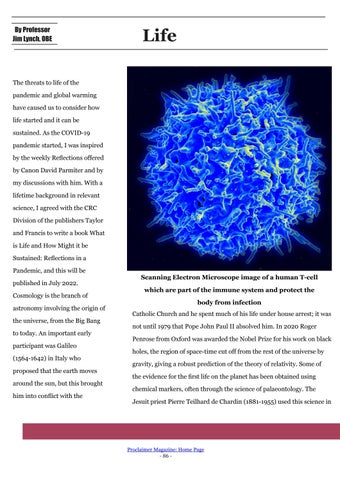By Professor Jim Lynch, OBE
Life
The threats to life of the pandemic and global warming have caused us to consider how life started and it can be sustained. As the COVID-19 pandemic started, I was inspired by the weekly Reflections offered by Canon David Parmiter and by my discussions with him. With a lifetime background in relevant science, I agreed with the CRC Division of the publishers Taylor and Francis to write a book What is Life and How Might it be Sustained: Reflections in a Pandemic, and this will be published in July 2022. Cosmology is the branch of astronomy involving the origin of the universe, from the Big Bang to today. An important early participant was Galileo (1564-1642) in Italy who proposed that the earth moves around the sun, but this brought him into conflict with the
Scanning Electron Microscope image of a human T-cell which are part of the immune system and protect the body from infection Catholic Church and he spent much of his life under house arrest; it was not until 1979 that Pope John Paul II absolved him. In 2020 Roger Penrose from Oxford was awarded the Nobel Prize for his work on black holes, the region of space-time cut off from the rest of the universe by gravity, giving a robust prediction of the theory of relativity. Some of the evidence for the first life on the planet has been obtained using chemical markers, often through the science of palaeontology. The Jesuit priest Pierre Teilhard de Chardin (1881-1955) used this science in
Proclaimer Magazine: Home Page - 86 -






















